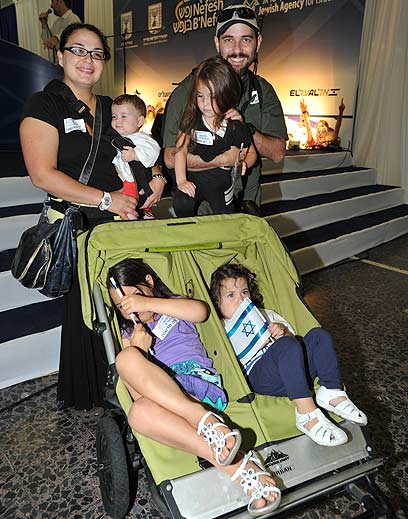
Every Israeli parent is used to complain about the payments they are asked to pay every year – whether for the annual school trip, class party, cultural activities, parents' committee or anything else – with amounts reaching hundreds of shekels if not more.
A significant number of American Jews, particularly religious-Orthodox families, don't settle for public schools and send their children to receive what they perceive as more suitable education in private schools.
But the cost of those schools is so high, that some prefer to earn their salaries in shekels but get free Jewish education.
$30,000 a year for school
Ethan and Ruth Hametz from Queens, New York made aliyah last week. One of the reasons for this move was the cost of education. The couple has four small children, two of whom studied in private schools in the past year.
Ethan says they paid $7,000 a year just for the Jewish daycare center. Add an additional $11,000 they paid for the Jewish kindergarten – and you'll get an annual expense of $18,000 for very young children, and the price just soars as the children grow up and the school hours become longer.
The Hametzs, by the way, did not choose a particularly expensive school. They say there are Jewish schools which charge much more, reaching up to $30,000 a year at the age of high school.
Taking into account the fact that the average income in the US is around $50,000, and that a reasonable health insurance costs about $1,400 a month ($17,000 a year), one reaches the conclusion that parents with three children studying in the Jewish education system must earn three times the average salary in order to provide for the family, own an apartment and a car, pay bills and meet all school payments.

"When our friends heard that we had a fourth child, they said we were crazy," says Ruth Hametz. "Almost everyone in our community has up to three kids. The expenses are huge. You won't find large families here, it's just impossible, even when you earn way above the average."
According to the couple, in New York it’s not uncommon to find families in which only one spouse works – but not among Jewish families. They must earn more money, as there is no other way to pay for the children's education.
Ethan and Ruth, on the other hand, believe the children should grow up with their mother, even at the "cost" of making aliyah.
The family arrived in Israel last week on a flight organized by the Nefesh B'Nefesh organization, accompanied by a Ynet correspondent. From the airport the family traveled to Ramat Beit Shemesh, where they have chosen to settle.
Their children will study in state-religious schools and kindergartens, and they hope their adjustment process will run as smoothly as possible. The two parents say they always dreamed of immigrating to Israel, and decided to do so when their eldest daughter reached the first grade.
And had you earned four or five times the average salary in the US, would have you have still made aliyah?
"Good question," says Ruth, and her husband replies: "I suppose we would have bought a property in Israel and traveled back and forth from the US to Israel."
After thinking about it for a few more minutes, the two recall the dream they had since they were young and provide a different answer: "Yes, we would have immigrated to Israel. It's the best place for our kids."
Reinforcement in public school
Adam and Annette Berger decided to immigrate to Israel 20 years ago, but their course of life somehow made them stay in New Jersey, where their four children were born, the youngest aged nine.
Their aliyah was hindered by a different reason each time, until last year they decided not to give up, knowing that if they would wait any longer their second child would start high school and they would have to wait a few more years.
Although the Bergers earned way above the average (he works in marketing and she is a psychologist) and their immigration mainly involves Zionism, they too say that the first thing they heard when they informed their friends that they were making aliyah was, "Oh, great, now you won't have to pay tuition."
They say the price of education in Jewish communities in North American is definitely an issue which encourages aliyah.

The Bergers say that thanks to the fact that one of their sons studied in a school in which Annette worked as a psychologist, they paid tuition for only three of their children, which amounted to $45,000 a year.
For elementary school studies they paid $15,000 a year, but when it comes to high school the price jumps to $20-23,000.
And there's no way out?
"The huge cost of education definitely prompted parents to get organized and try to find a solution to the problem. All kinds of directions are being examined.
"One of the attempts to make it easier on the parents is to send the children to public schools and add private extracurricular Jewish lessons. The problem is that as these are governmental schools, they are not allowed to teach religion, and the extracurricular activity focuses on culture and folklore."
The Bergers say families who find it difficult to pay for their children's studies can turn to subsidization based on donations, although then they must face bureaucratic barriers and particularly tough conditions.
If a family seeking aid takes a vacation, renovates it house or can get assistance from the child's grandparents – it won't get the grant.
Upon arriving in Israel, the Bergers headed to Ma'ale Adumim, where they plan to live. They have already signed up their eldest daughter to the Zvia religious girls' high school, and their son will study in a high school yeshiva. The other two children will go to state-religious schools.
"As Jews, we believe we must live here, in the land of Jews," they conclude.
Earning less, spending less
Judah and Chaya Fish were also on the Nefesh B'Nefesh plane last week. The couple from Chicago has three children aged two, four and six.
They clarify that they are not immigrating to Israel because of the price of education, but that "it's definitely nice". In the meantime they are living in Jerusalem, but may move if the cost of living turns out to be too high.
"Two things are very cheap in Israel compared to the US – education and health," the parents say. "People always say that you're going to earn much less, but economizing in those two areas compensates for it."
Danny Oberman, executive vice president at Nefesh B'Nefesh, adds that "the cost of education in North America is among the main reasons for the decision of many families to immigrate to Israel, especially in the past two years, in light of the financial crisis in the US.
"We hear from many parents who made aliyah with us in recent years how happy they are with the decision they made, and with the fact that they not only got to give their children a better Jewish and Zionist education than in Jewish schools in the US, but also managed to save a lot of money.
"In quite a few cases, we are talking about saving more than $100,000 per family a year."
The Nefesh B'Nefesh organization was founded in 2002 in order to encourage immigration to Israel from Western countries. In collaboration with the Jewish Agency and the Israeli government, the organization has brought more than 27,000 new olim from the US, Canada and England in the past nine years.
Some 250 new immigrants arrived in Israel last week through Nefesh B'Nefesh.
- Follow Ynetnews on Facebook















